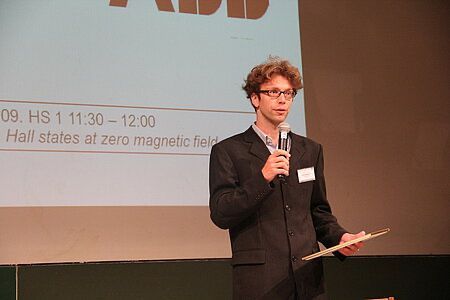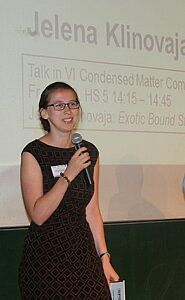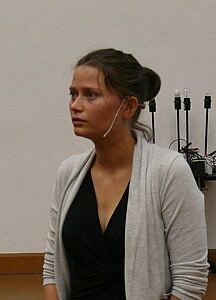The winners of the SPS Awards 2013
The SPS Award committee, presided by Prof. Louis Schlapbach, had the great pleasure to select the SPS award winners 2013 from many submitted papers of excellent scientific quality.
The winners presented their work at the joint annual meeting in Linz. Please find in the following the laudationes written by L. Schlapbach, and the summaries written by the authors.

SPS Award in General Physics, sponsored by ABB
Titus Neupert is awarded with the SPS 2013 Prize in General Physics for his pioneering PhD work, especially for his theoretical discovery of "Fractional quantum Hall states at zero magnetic field".
The integer and fractional quantum Hall effects were experimentally detected in 1981 and 1982, respectively, at cryogenic temperatures. The discovery of graphene in 2005 established that the integer quantum Hall effect could be achieved at room temperature. Theorists predicted that the integer quantum Hall effect was one out of many examples of a larger family of semiconducting states supporting quantized susceptibilities in materials called topological band insulators. Titus Neupert gave the first quantitative answer to the question whether strong interactions could drive a fractional topological insulator in very much the same way as interactions drive a fractional quantum Hall insulator. One of the most remarkable prediction made by the award winner is that, by taking advantage of materials with strong spin-orbit coupling, it might become possible to achieve a fractional quantum Hall effect that is robust at room temperature and this without the use of any laboratory magnetic field.

SPS Award in Condensed Matter Physics, sponsored by IBM
Jelena Klinovaja is awarded with the SPS 2013 Prize in Condensed Matter Physics for her excellent theoretical work on hybrid superconducting-semiconducting nano structures in the presence of Rashba spin-orbit interaction as well as helical magnetic fields. Their interplay leads to a competition of phases with two topological gaps closing and reopening, resulting in unexpected reentrance behavior. Besides the topological phase with localized Majorana fermions (MFs) she found novel phases characterized by fractionally charged fermion (FF) bound states of Jackiw-Rebbi type. These most original pieces of work open up graphene-based materials to spin physics and in particular to Majorana fermions with non-abelian statistics, predicted to be useful for topological quantum computing.

SPS Award in Applied Physics, sponsored by OC Oerlikon
Iris Crassee is awarded with the SPS 2013 Prize in Applied Physics for her excellent PhD work on magneto-optical properties of graphene and the discovery of giant Faraday rotation in the terahertz range in single and multilayer graphene epitaxially grown on silicon carbide. She pioneered the application of the infrared Hall spectroscopy, where both transmission and Faraday rotation are measured in a broad frequency range, to graphene, which allowed her to distinguish Landau-level transitions that stem from different graphene layers.